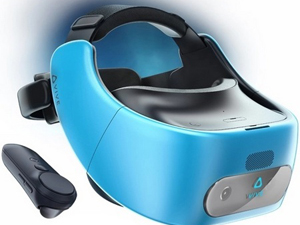



Date:15/11/17
 At HTC’s Vive Developer Conference, the company finally got to show off its upcoming standalone headset to the Beijing crowd – the Vive Focus.
At HTC’s Vive Developer Conference, the company finally got to show off its upcoming standalone headset to the Beijing crowd – the Vive Focus.
Designed to be an all-in-one device, the Focus won’t need to be hooked up to a powerful desktop PC in order to run and won’t have the same interactivity constraints that mobile VR currently has.
Instead, the unit intends to tread the lines between power, portability, and affordability, which puts it in competition with some recently announced Oculus headsets, in particular the Project Santa Cruz and the more affordable Oculus Go.
The headset will feature an AMOLED display and is powered by a Qualcomm Snapdragon 835 CPU, capable of "world-scale" tracking – the name HTC is giving to its inside-out 6DoF (six degrees of freedom) tracking. This allows for detecting three-dimensional movement and rotation in any environment, with no need for additional external sensors.
Touted at Google IO 2017 as being one of the first standalone Google Daydream headsets that doesn't rely on a phone for power, Google VR's Clay Bavor has confirmed that the Vive Focus won't be coming to the platform, but instead will run on its own software.
The Vive Focus hasn’t been given any official launch date or pricing, but it’s safe to assume that it'll be available in China before going global.
HTC reveals standalone Vive Focus VR headset
 At HTC’s Vive Developer Conference, the company finally got to show off its upcoming standalone headset to the Beijing crowd – the Vive Focus.
At HTC’s Vive Developer Conference, the company finally got to show off its upcoming standalone headset to the Beijing crowd – the Vive Focus.Designed to be an all-in-one device, the Focus won’t need to be hooked up to a powerful desktop PC in order to run and won’t have the same interactivity constraints that mobile VR currently has.
Instead, the unit intends to tread the lines between power, portability, and affordability, which puts it in competition with some recently announced Oculus headsets, in particular the Project Santa Cruz and the more affordable Oculus Go.
The headset will feature an AMOLED display and is powered by a Qualcomm Snapdragon 835 CPU, capable of "world-scale" tracking – the name HTC is giving to its inside-out 6DoF (six degrees of freedom) tracking. This allows for detecting three-dimensional movement and rotation in any environment, with no need for additional external sensors.
Touted at Google IO 2017 as being one of the first standalone Google Daydream headsets that doesn't rely on a phone for power, Google VR's Clay Bavor has confirmed that the Vive Focus won't be coming to the platform, but instead will run on its own software.
The Vive Focus hasn’t been given any official launch date or pricing, but it’s safe to assume that it'll be available in China before going global.
Views: 466
©ictnews.az. All rights reserved.Similar news
- Cellphone Use May Raise Cancer Risk
- Australian police pushes cyber safety education
- Vietnam aims to lead in e-government
- Senate Website Gets Hacked
- US builds net for cyber war games
- Japan enacts anti-computer virus law
- India passes law vs e-waste
- Anonymous Declares War On The City Of Orlando
- Microsoft highlights evolving dangers as online identity data proliferates
- Consumers want internet security to be provided by banks
- Government facilities targets of cyber attack
- South Korean web attacks might been war drill
- Sri Lanka to Establish National Passport Database to Increase Border Security
- Hi-tech crime agencies set to employ information security professionals
- Phone hacking and online campaign bring down the News of the World





















